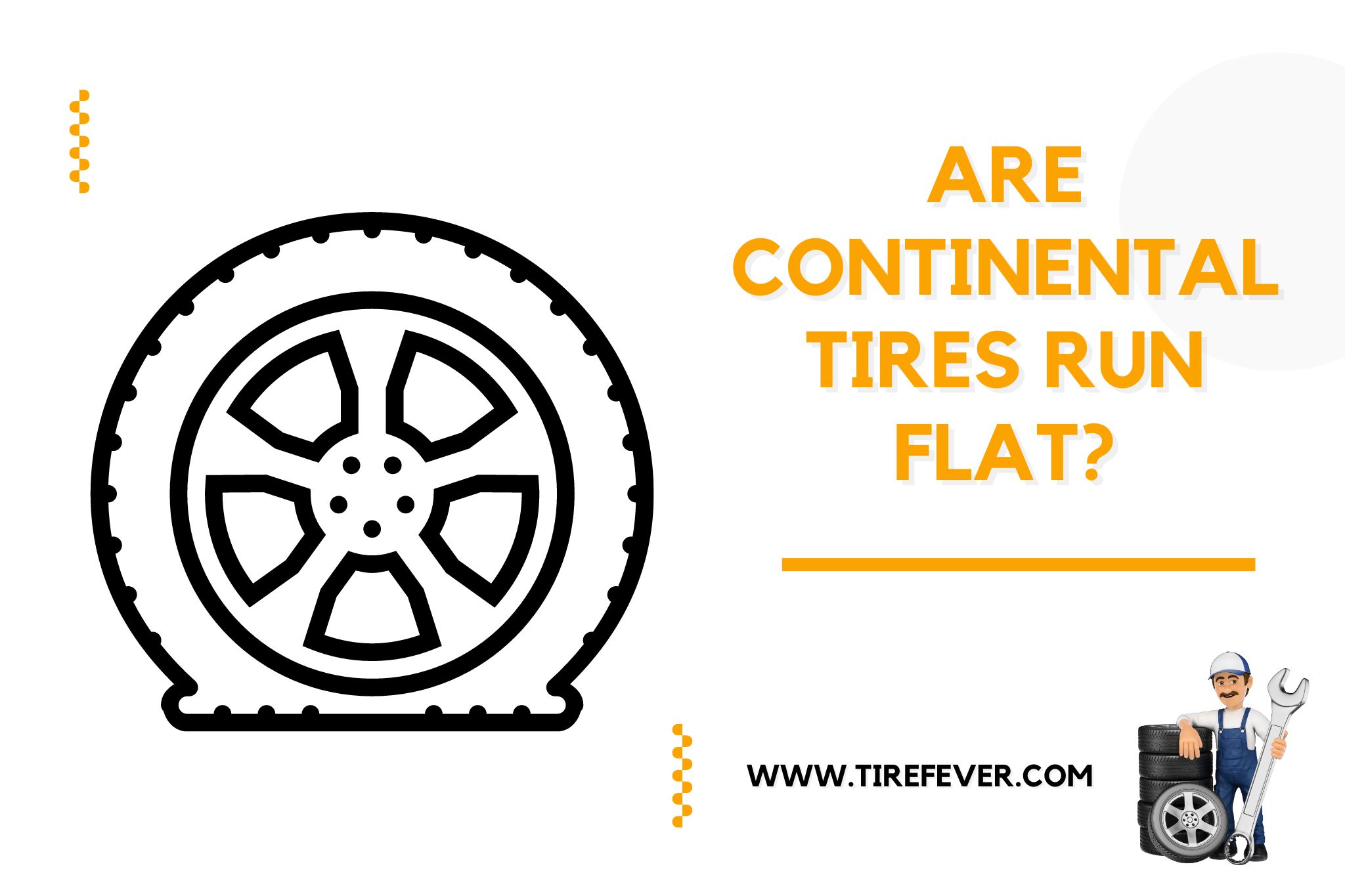If you’re in the market for new tires, you may be wondering, “Are Continental tires run flat?” This is a common question among car owners looking for reliable and durable tire options. The demand for run-flat tires has been on the rise as more drivers prioritize safety and convenience on the road.
Continental is a well-known tire brand with a reputation for producing high-quality products, but when it comes to run-flat technology, there are specific factors to consider. Understanding the features and benefits of Continental run-flat tires can help you make an informed decision when choosing the right tires for your vehicle.
Highlights:
- Continental Tires offers run-flat options for increased safety and convenience
- Run-flat tires allow drivers to continue for a limited distance after a puncture
- Continental run-flat tires are designed to support the weight of the vehicle even when deflated
Are Continental Tires Run Flat?
Yes, Continental Tires offers a range of run-flat tire options for vehicles. As a reputable tire manufacturer, Continental has developed run-flat technology that allows drivers to continue driving for a limited distance even after experiencing a puncture. This technology provides additional safety and convenience for drivers, especially in emergency situations.
The run-flat tires from Continental are designed to support the weight of the vehicle and maintain their shape even when deflated. This allows drivers to continue driving at a reduced speed to reach a service station or a safe location for repair or replacement. Continental’s run-flat tires are a popular choice for drivers who prioritize safety and reliability on the road.
You May Also Like: Are Pirelli Tires Run Flat?
Are all Continental Tires Run Flat?
Not all Continental tires are run-flat tires. Continental offers a variety of tire types, including run-flat, but not all of their tires have this feature. Run-flat tires are designed to maintain limited mobility for a short distance after a puncture, allowing the driver to reach a safe location for repair or replacement. Continental’s run-flat tires are engineered with reinforced sidewalls to support the vehicle’s weight even with a loss of air pressure.
It’s essential for consumers to confirm the specific features of the Continental tires they are interested in, as not all of their tires are run-flat. By understanding the different tire options available from Continental, drivers can choose the right tire for their specific needs and preferences. Whether seeking run-flat capabilities or other tire attributes, consumers should consult with a tire professional to determine the best option for their vehicle.
Benefits of Run-Flat Tires
Run-flat tires offer a range of benefits for drivers, including increased safety and convenience. By allowing you to continue driving for a limited distance after a puncture, run-flat tires reduce the risk of being stranded on the side of the road. This can be especially valuable in emergencies or when driving in remote areas without easy access to help.
In addition to the safety benefits, run-flat tires also provide peace of mind and convenience for drivers. With run-flat tires, there’s no need to pull over and change a tire in unsafe or unfamiliar areas, allowing you to continue driving to a safe location or a nearby service center. This can save time and hassle, making run-flat tires a valuable investment for many drivers.
Also Read: Are Dunlop Tires Run Flat?
How Long Can Continental Run-Flat Tires Last??
Continental run-flat tires are designed to run for up to 50 miles at speeds of up to 50 miles per hour after a puncture or loss of pressure. This is due to their reinforced sidewalls which provide support and allow the tires to continue functioning even with low or no air pressure. The actual lifespan of these tires can vary depending on factors such as driving habits, road conditions, and maintenance. It’s recommended to regularly inspect and maintain run-flat tires to ensure proper functionality and longevity.
Continental run-flat tires can last for thousands of miles if properly maintained, but it’s important to note that they should not be driven on indefinitely once a puncture occurs. While they provide temporary mobility after a tire failure, they are not a permanent solution and should be replaced or repaired as soon as possible. Following the manufacturer’s guidelines for tire maintenance and replacement will help ensure the longest possible lifespan for Continental run-flat tires.
Can You Repair Continental Run-Flat Tires?
Yes, it is possible to repair Continental run-flat tires, but it is important to keep in mind that not all damage can be fixed. For example, punctures in the sidewall or shoulder of the tire are typically not repairable due to the structural integrity of the tire being compromised.
When it comes to repairing Continental run-flat tires, it’s crucial to follow the manufacturer’s guidelines and consult a professional tire technician. Additionally, some tire manufacturers may have specific recommendations or restrictions on repairing run-flat tires, so it’s important to be aware of any guidelines provided by Continental.
Ultimately, while it is possible to repair Continental run-flat tires in certain situations, it’s essential to prioritize safety and consult with a professional to determine the best course of action for addressing any tire damage.
Can you replace run-flat tires with regular tires?
Yes, run-flat tires can generally be replaced with regular tires, but it’s important to consider a few factors before making the switch. Run-flat tires are designed to support the weight of the vehicle even after a puncture, allowing the driver to continue driving for a limited distance at a reduced speed. Regular tires do not have this feature, so it’s essential to ensure that the vehicle is equipped with a spare tire or tire repair kit in case of a flat tire.
Additionally, replacing run-flat tires with regular tires may also impact the vehicle’s handling and performance, as run-flat tires are often stiffer and provide better stability during a flat tire situation. It’s crucial to consult with a professional mechanic or tire specialist to determine the compatibility and implications of switching from run-flat tires to regular tires on a specific vehicle. Overall, while it is possible to replace run-flat tires with regular tires, it’s important to carefully consider the potential implications and make an informed decision based on individual vehicle and driving needs.
Also Read: Are Firestone Tires Run Flat?
Final Thoughts
In conclusion, Continental offers run-flat tires that provide temporary mobility after a puncture, prioritizing safety and convenience for drivers. These tires are designed to support the vehicle’s weight and maintain their shape when deflated, allowing drivers to continue driving for up to 50 miles at speeds of up to 50 miles per hour. While they can be repaired in certain situations, not all damage can be fixed, and it’s important to follow the manufacturer’s guidelines and consult a professional tire technician. Ultimately, Continental run-flat tires offer valuable safety and convenience benefits for drivers prioritizing reliability on the road.
This post contains affiliate links. Read the full disclosure here.


I am passionate about all things automotive and have a deep understanding of the topic. As a mechanic, I use my free time to share knowledge of everyday challenges that any car owner can experience – helping you make informed decisions about tires.

